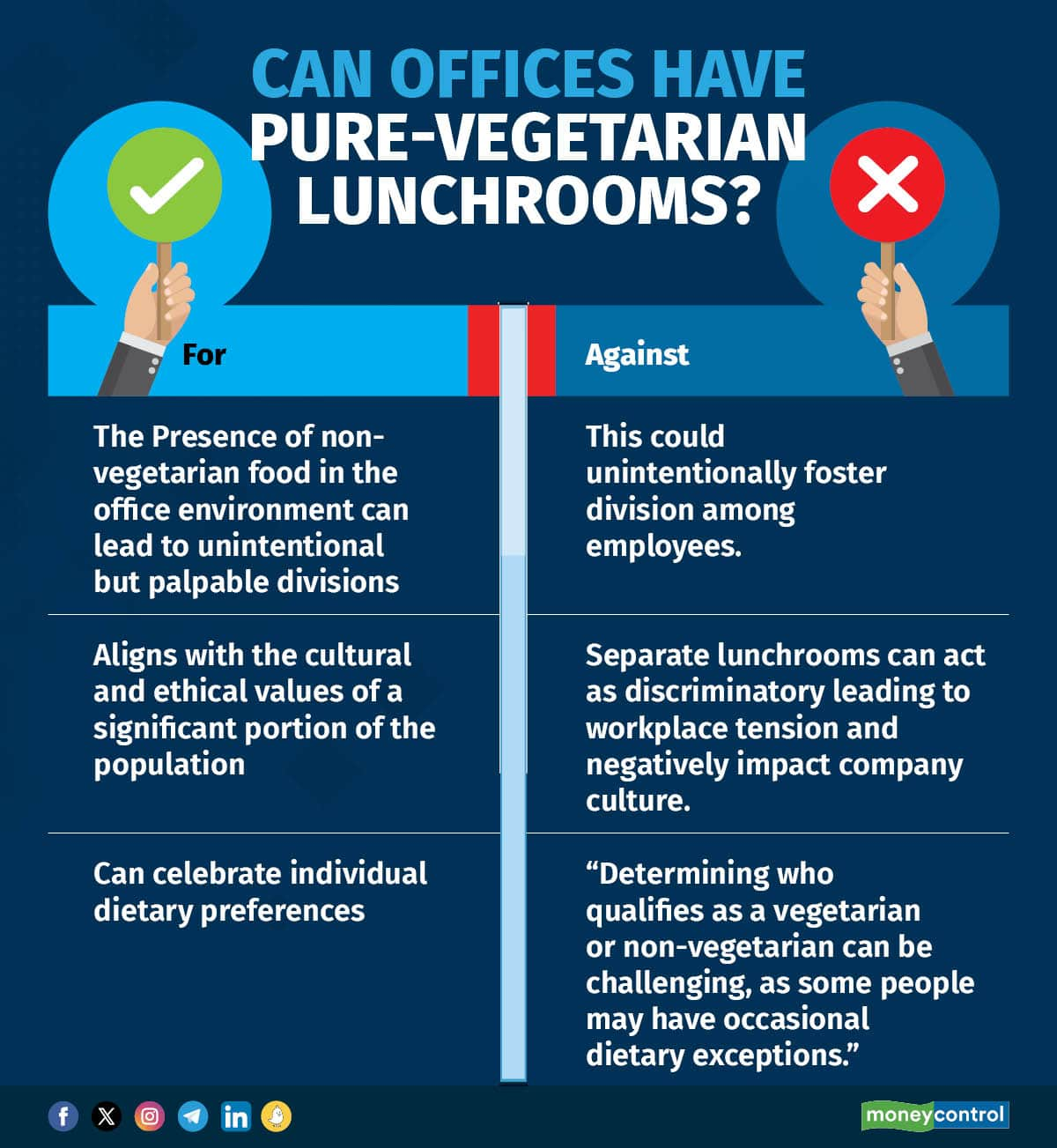



Delhi-based Raghav Mishra*, 26, prefers not to eat in his office canteen as it serves non-vegetarian food, even though he brings his own home-made meals. This owes to his strict rule of eating in a “pure-veg” place. However, when he proposed to his boss that there be separate eating spaces, the notion was challenged by a few of his colleagues.
Nikhil* opposed it on two points: one of course was the inherent problems of catering to the dietary preferences of all employees, and the other was the perception of purity.
“Diversity should be celebrated and providing both vegetarian and non-vegetarian options ensures inclusivity. Of course, employees should have the freedom to choose their meals without restrictions,” he said, adding that having “pure veg” lunchrooms implies that non-vegetarians are "impure".
India is a land of diverse religious, cultural and dietary practices. Vegetarianism is deeply ingrained in the Indian way of life, with a significant portion of the population adhering to various vegetarian diets for religious or ethical reasons. On the other hand, there is an equably sizeable if not larger population that consumes non-vegetarian food without any qualms.
ALSO READ | Breastfeeding at workplace remains taboo despite growing narrative around inclusion
Not addressing the issue poses threats that include maintaining a harmonious work due to “cultural sensitivity”. The environment becomes challenging when dietary preferences become a point of contention. In addition, managing separate lunchrooms, especially in larger offices, can be logistically challenging and expensive.
Inclusion or separation?The debate between pure-vegetarian and mixed lunchrooms in Indian offices reflects the nation's diversity and the complex interplay of cultural beliefs and dietary choices. While finding common ground can be challenging, it is essential for fostering a collaborative and inclusive environment where all employees feel valued and respected, regardless of their dietary preferences.
“As employees gradually return to the office, physical segregation could inadvertently lead to social divisions among employees, which could hinder the natural flow of interactions and camaraderie,” said Santhosh Nair, director and chief operating officer of consultancy firm CIEL HR.
The vast majority of Indian adults (81 percent) follow some restrictions on meat in their diet, including refraining from eating certain meats, not eating meat on certain days, or both, according to a new 2021 Pew Research Center survey. However, most Indians do not abstain from meat altogether—only 39 percent of Indian adults describe themselves as "vegetarian".,
ALSO READ | CXO median compensation rise slows to 12% in FY23; NTPC records highest growth: Report
Nevertheless, the idea of separate lunchrooms has some takers. Chandrasekar Kesavan, director at Global Capability Centre (GCC) firm Equiniti India feels that while there may be some logistical challenges in establishing separate lunch spaces, it's an exciting opportunity for him to promote unity among employees.
“By providing an array of that cater to both vegans and non-vegetarians, we're not only celebrating individual dietary preferences but also strengthening the sense of camaraderie among colleagues,” he said.

This comes with its own complications. Dietary preferences in India can vary widely based on regional, cultural and religious factors. Some industry leaders say separating lunchrooms according to broad categories like vegetarian and non-vegetarian may not adequately address these nuances.
“The feasibility of creating separate lunch rooms is there, but I wouldn't recommend doing that,” said Rohit Hasteer, Group CHRO of real estate firms PropTiger.com, Housing.com, and Makaan.com.
ALSO READ | Decoding how a climate career in India looks like
He said if one contemplates the rush at peak lunch hour in every office cafeteria, irrespective of its size, it will look small. Bifurcating the cafeteria further, based on meal preferences, might just cramp the place even further.
If office cafeterias can offer all types of meals, carefully prepared, Hasteer does not think vegans should have a problem adjusting in a workplace. “In fact, the way people are ‘cared for’ is what makes them adjust or not adjust in a workplace, not the cafeteria dynamics,” he added.
(*name changed on request)Discover the latest Business News, Sensex, and Nifty updates. Obtain Personal Finance insights, tax queries, and expert opinions on Moneycontrol or download the Moneycontrol App to stay updated!
Find the best of Al News in one place, specially curated for you every weekend.
Stay on top of the latest tech trends and biggest startup news.